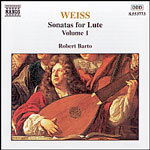
Lute Sonatas Vol.1: Sonata No. 36, 42 and 49
 $25.00
Out of Stock
$25.00
Out of Stock6+ weeks add to cart
SILVIUS WEISS
Lute Sonatas Vol.1: Sonata No. 36, 42 and 49
Robert Barto (lute)
[ Naxos / CD ]
Release Date: Sunday 16 January 2005
This item is currently out of stock. It may take 6 or more weeks to obtain from when you place your order as this is a specialist product.
"He is a supple and stylish performer, and this excellently recorded disc contains some of the finest playing of Weiss I have yet heard. Very strongly recommended."
- Gramophone
He was born in the area we now know as Poland, but moved with his family to Düsseldorf where he, his father and brother were engaged as lutenists to the Palatine Court. In 1708 he joined the exiled Prince Aleksander Sobieski of Poland at his home in Rome, and became his lute player until Sobieski's death in 1714. That part of his life was to prove a turning point, as he now had experience of the music of the great Italian composer's of the time, Corelli, Scarlatti and Marcello.
How much he learned from them we do not know, neither do we know if he ever had any formal tuition in composition. Yet he was to write over 600 works - almost exclusively for lute - an Italian influence is evident throughout.
He returned to Germany and spent the last 32 years of his life in Dresden where he worked as a musician at the court, eventually becoming the most celebrated instrumentalist in Dresden.
During this latter period he wrote a book of 34 Sonatas (now in the library in Dresden) - though it would be more accurate to describe them as suites - and there is a much larger number gathered in a volume at the British Library.
That the title of some of the movements do not quite match the music, exemplifies the fact that these works would have been embellished and improvised during Weiss's performance. Indeed these compositions were taking the instrument into a new world, quite comparable with anything Bach was to write.
They were conceived on the grand scale - all the works on this disc lasting over twenty minutes - and are in multiple movements, expertly contrasted.
Sadly Weiss was the last of an era. His death in 1750 almost marked the decline in the popularity of the instrument, and though it seems strange to us, the lute was rarely heard throughout the nineteenth century.
Robert Barto is American and studied at the University of California where he obtained the scholarship to come to Europe to work with distinguished teachers, Michael Schaeffer and Eugene Dombois. Since then he has appeared throughout Europe and North America, his 'home' now in Stuttgart, Germany, where he teaches at the Music School.
He plays on a modern copy of a baroque lute by Andrew Rutherford, and made this first volume in the complete sonatas - a lifetime occupation - at sessions recorded in Newmarket, Canada, during February 1996.
While there are recordings of a selection of the Sonatas, this will be the world first recording of the complete cycle.
Tracks:
Lute Sonata No. 36 in D minor
Lute Sonata No. 49 in B flat major
Lute Sonata No. 42 in A minor
